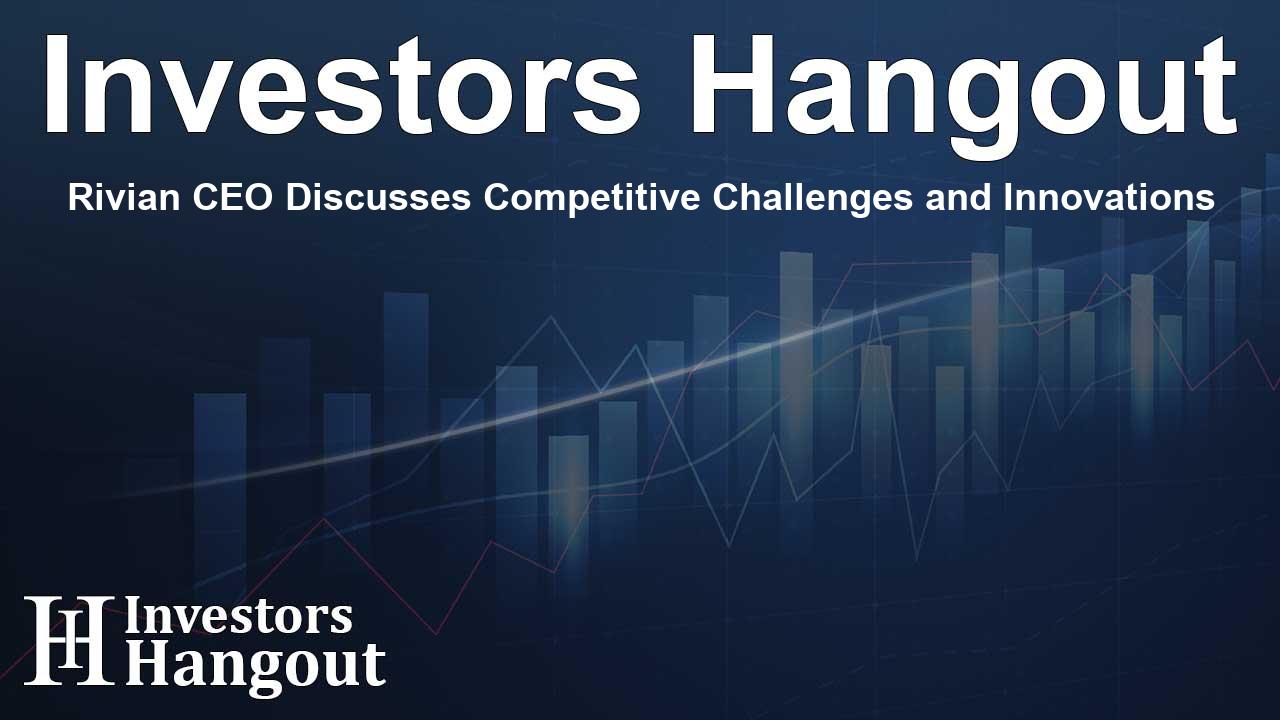Rivian CEO Discusses Competitive Challenges and Innovations

Rivian CEO RJ Scaringe's Perspective on Market Competition
Rivian Automotive Inc. (NASDAQ: RIVN) CEO and founder RJ Scaringe has publicly defended the company's omission of Apple Inc.'s (NASDAQ: AAPL) CarPlay from their electric vehicles (EVs). He emphasized how external factors, particularly those influenced by Chinese competitors, play a vital role in shaping Rivian's strategy.
Upcoming Rivian R2 Deliveries
During a recent appearance on the "Decoder" podcast, Scaringe revealed that Rivian is gearing up for substantial developments ahead. He announced that deliveries of the much-anticipated R2 midsize electric SUV are set to commence in the early part of the upcoming year, specifically in the first half of the year. This timeline demands that Rivian begin producing saleable units right away.
The company is currently deep in the development process, with Scaringe expressing confidence about the R2 project, stating, “We are looking at an official launch by August, and we are on track.” This forward momentum is backed by their ongoing investment in a robust manufacturing facility.
Influence of Chinese Competitors
When discussing the competitive landscape, Scaringe highlighted the challenges posed by firms like BYD Co. Ltd. (OTC: BYDDF, OTC: BYDDY). He noted that these companies enjoy significant cost advantages due to lower production expenses and inexpensive labor in China. Scaringe explained, “Companies like BYD have leveraged their lower capital and operational costs, which fundamentally alters their pricing dynamics.”
He pointed out that this competitive disadvantage challenges Rivian, which must rely on higher-cost production processes that lack similar efficiencies.
Tariff Impacts and Supply Chain Strategies
With ongoing tariff implications affecting the automotive sector, Scaringe addressed concerns regarding the trade environment. He acknowledged that while recent changes in trade policies add an extra layer of cost, Rivian has managed to navigate these complexities with foresight. He praised the company's U.S.-centric supply chain as a strategic advantage for the R2 launches.
However, Scaringe also recognized that certain essential materials, like rare earth metals, are sourced from beyond U.S. borders. He admitted that to fulfill their ambitious production goals, Rivian must maintain trade relationships that cross international lines.
Choosing Not to Include Apple CarPlay
On the topic of CarPlay's omission from Rivian's offerings, Scaringe clarified that this was a deliberate business decision. He expressed a strong belief that Rivian's proprietary software capabilities will ultimately serve their users better than third-party applications. By foregoing CarPlay, Rivian intends to offer a more integrated and personalized user experience.
Scaringe stated, “We want to ensure that our software fully utilizes the vehicle's capabilities, ensuring features like advanced voice-to-text functionality and top-notch navigation systems are all in place.”
Future Tech Developments and Autonomous Driving
Looking ahead, Scaringe shared Rivian's aspirations to incorporate autonomous driving technology into their products. He projected that by 2027, the company could offer significant autonomous features, further enhancing the appeal of their electric vehicles.
He highlighted LiDAR sensors as a crucial component of this strategy, asserting, “We believe that LiDAR provides a substantial advantage for achieving our autonomous driving goals.” Through these innovations, Rivian aims to solidify its standing in the burgeoning EV landscape.
Frequently Asked Questions
What insights did RJ Scaringe share about Rivian's R2 SUV?
He announced that deliveries of the R2 SUV are expected to begin in the first half of the upcoming year.
How does Rivian view the competition from Chinese manufacturers?
Scaringe highlighted that Chinese competitors like BYD have cost advantages that affect Rivian's market position.
What are the implications of tariffs on Rivian's production costs?
Scaringe stated that recent trade policy changes could increase production costs, but Rivian has robust planning strategies to mitigate this.
Why did Rivian decide against including Apple CarPlay in their vehicles?
Rivian aims to focus on custom software solutions that leverage the full potential of their vehicles, rather than relying on third-party options like CarPlay.
What future technologies is Rivian pursuing?
Scaringe indicated plans for the integration of autonomous driving technology by 2027, emphasizing the role of LiDAR in this initiative.
About The Author
Contact Lucas Young privately here. Or send an email with ATTN: Lucas Young as the subject to contact@investorshangout.com.
About Investors Hangout
Investors Hangout is a leading online stock forum for financial discussion and learning, offering a wide range of free tools and resources. It draws in traders of all levels, who exchange market knowledge, investigate trading tactics, and keep an eye on industry developments in real time. Featuring financial articles, stock message boards, quotes, charts, company profiles, and live news updates. Through cooperative learning and a wealth of informational resources, it helps users from novices creating their first portfolios to experts honing their techniques. Join Investors Hangout today: https://investorshangout.com/
The content of this article is based on factual, publicly available information and does not represent legal, financial, or investment advice. Investors Hangout does not offer financial advice, and the author is not a licensed financial advisor. Consult a qualified advisor before making any financial or investment decisions based on this article. This article should not be considered advice to purchase, sell, or hold any securities or other investments. If any of the material provided here is inaccurate, please contact us for corrections.
